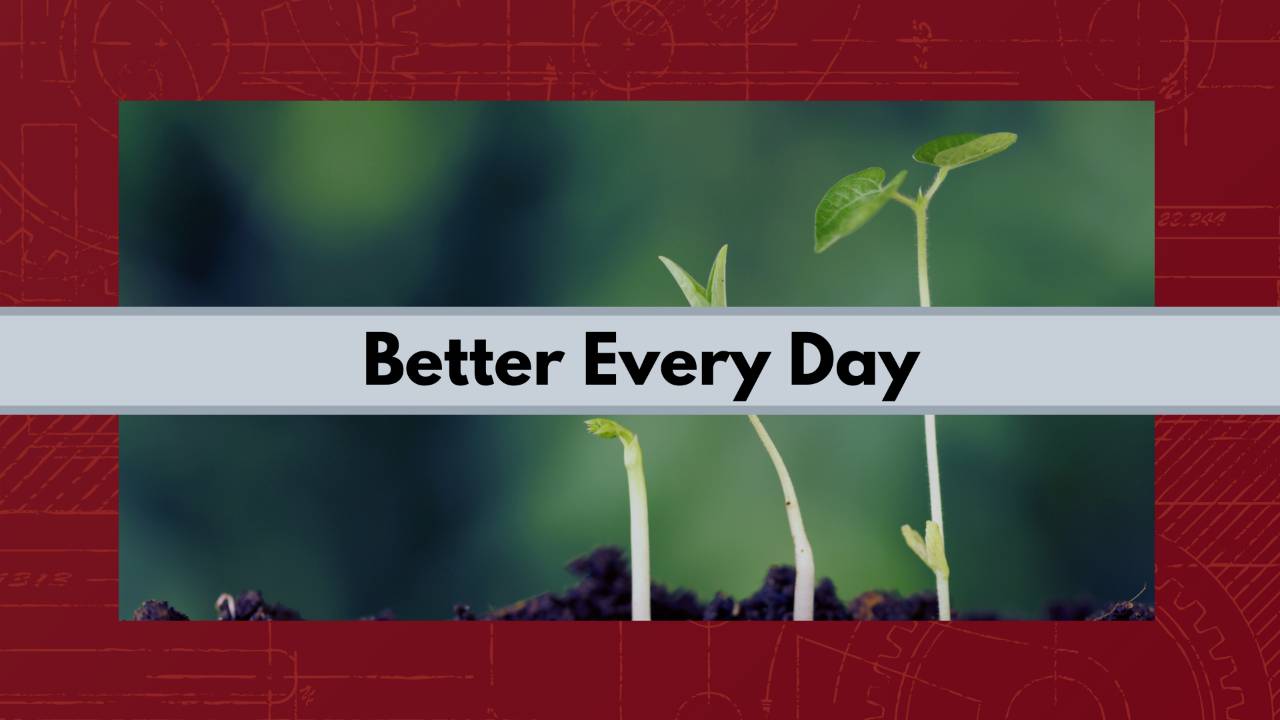Better Every Day
Your 52-Week Journey for Peak Performance
Whether you're an entrepreneur, an artist, a student, or someone just passionate about lifelong learning and self-improvement, "Better Every Day" is curated to fuel your fire. If you believe in the power of consistency and value the gratification that comes from personal growth, this journey is for you.
|
In our fast-paced world, we're always on the hunt for the next big thing that can boost our performance. We often focus on hard skills, strategic planning, and pushing our limits. But what if I told you that something as simple as gratitude could be your secret weapon? That's right – gratitude. Not just the quick 'thanks' in an email, but a real, heartfelt practice of recognizing the good stuff in our lives.
Gratitude is more than just a pleasant addition to our daily lives; it's a powerful catalyst for enhancing our health, well-being, and overall performance. The impact of gratitude also extends beyond personal benefits, influencing team dynamics and leadership effectiveness. Research, including studies by Emmons and McCullough (2003), has shown that practicing gratitude can significantly boost both our physical and mental health. But the benefits don't stop there. Gratitude also shapes us into better leaders and collaborators, as highlighted in the findings of Grant and Gino (2010).
In this article, we'll dig into the transformative power of gratitude, examining how it can elevate performance in both personal and professional settings.
The Individual Benefits of Adopting a Mindset of Gratitude
Embracing a mindset of gratitude can profoundly impact an individual's overall well-being, health, stress levels, and resilience. This transformative approach to life, grounded in research, offers a pathway to not only cope with life's challenges but to thrive despite them. Here are a few of the benefits that research has shown:
- Enhanced Health and Well-Being
The link between gratitude and improved physical health is well-documented. Individuals who regularly engage in gratitude practices often report fewer physical ailments and are more likely to care for their health, according to a study by Emmons and Stern (2013). They tend to exercise more regularly and seek medical help when needed, contributing to longer and healthier lives.
Gratitude's impact on psychological well-being is also significant. Research by Wood, Froh, and Geraghty (2010) demonstrates that gratitude effectively reduces the frequency and duration of episodes of depression. It fosters a positive outlook on life, elevating feelings of happiness and joy. This shift in perspective can lead to a more fulfilling and satisfying life, marked by an appreciation for the present moment and a decreased focus on materialistic pursuits.
- Reduced Stress and Enhanced Coping Skills
Gratitude also serves as a powerful tool in stress management. By acknowledging the positive aspects of life, individuals can shift their focus away from stressors, leading to a decrease in the physiological symptoms associated with stress. Hill, Allemand, and Roberts (2013) found that gratitude helps in reframing one's perception of stressful events, thereby reducing the emotional and physical toll of stress.
This reframing is crucial in developing enhanced coping skills. When faced with adversity, individuals who practice gratitude tend to view challenges as opportunities for growth and learning. This perspective not only alleviates immediate stress but also contributes to the development of long-term coping strategies, fostering a sense of control and competence in handling life's challenges.
- Increased Resilience
The role of gratitude in building resilience is particularly significant. The Broaden-and-Build Theory, proposed by Fredrickson (2001), suggests that positive emotions like gratitude expand an individual's thought-action repertoire. Think of this as a bigger toolkit of resources in which you can draw from. These higher levels of resilience allow individuals to recover more swiftly and effectively from difficulties. Also, resilience is not just about bouncing back from challenges but growing in the face of adversity. This growth is characterized by an increased capacity to manage future stressors and an enhanced ability to find meaning and purpose in difficult situations.
As you can see, adopting a gratitude mindset offers extensive benefits, impacting physical health, psychological well-being, stress management, and resilience. These benefits are also not short-term and pave the way for lasting improvements in quality of life and overall happiness.
Gratitude in the Workplace
In addition to the individual well-being and performance benefits, there are also a host of benefits to leaders. For decades, the corporate world has been largely driven by numbers, targets, and hard skills. Emotional intelligence and well-being were often seen as secondary, if not irrelevant, in the pursuit of business success. The traditional corporate performance metrics focused heavily on quantifiable results, leaving little room for the softer, more human aspects of work life. This approach, while effective in achieving short-term goals, often overlooked the long-term impacts on employee satisfaction, mental health, and overall workplace atmosphere.
The tide, however, is turning. There's a growing recognition of the importance of emotional intelligence in the workplace. Leaders and managers are beginning to understand that how employees feel directly impacts their productivity, creativity, and loyalty to the company. This shift is not just a moral imperative but a strategic one, as companies that prioritize the well-being of their employees tend to see better results in the long run.
The Role of Gratitude in Leadership and Team Dynamics
Gratitude plays a critical role in reshaping leadership and team dynamics. When leaders express genuine gratitude, it can create a positive workplace culture where employees feel valued and acknowledged. This isn't just about saying 'thank you' for a job well done. It's about creating an environment where gratitude is a fundamental part of daily interactions and processes.
- Building Trust and Openness: Leaders who regularly express gratitude can foster a sense of trust and openness in their teams. Employees feel more comfortable sharing ideas and taking risks when they know their contributions are appreciated.
- Enhancing Employee Engagement: Feeling appreciated is a key driver of employee engagement. When team members are acknowledged for their efforts, they are more likely to be invested in their work and committed to the organization's goals.
- Reducing Workplace Stress: Gratitude can also play a role in mitigating stress and burnout. Recognizing the hard work and dedication of employees can alleviate the pressure and stress that often come with corporate jobs.
- Improving Communication: Gratitude can improve communication within teams. When gratitude is expressed, it encourages a more positive and constructive form of communication, paving the way for better collaboration and problem-solving.
- Cultivating a Positive Work Environment: A culture of gratitude contributes to a more positive work environment overall. This positivity can be infectious, leading to improved morale and a sense of camaraderie among team members.
Integrating gratitude into corporate culture goes beyond mere politeness. It's about acknowledging the human element in business and leveraging it to build stronger, more resilient, and more effective teams. As we move forward in the corporate world, the inclusion of emotional intelligence, particularly gratitude, in performance metrics is not just beneficial but essential for sustainable success.
Putting it all together
In our quest for peak performance and personal fulfillment, the practice of gratitude emerges as a surprisingly powerful tool. It's important to remember that embracing gratitude doesn't demand hours of your day; rather, it thrives on consistency. A few moments of reflection, a heartfelt thank you, or a pause to appreciate the good around us can integrate gratitude into the moments of our daily lives. This simple, yet profound habit has the potential to enhance our health, reduce stress, and build resilience, fostering a positive impact that resonates through our personal and professional lives. By making gratitude a regular part of our routine, we open ourselves to a world of benefits, leading to a more satisfied, balanced, and productive life. The key is to start small, stay consistent, and watch as the transformative power of gratitude unfolds.
You can read about my personal experience with this practice [here].
References
Emmons, R. A., & McCullough, M. E. (2003). Counting blessings versus burdens: An experimental investigation of gratitude and subjective well-being in daily life. Journal of Personality and Social Psychology, 84(2), 377–389. https://doi.org/10.1037/0022-3514.84.2.377
Emmons, R. A., & Stern, R. (2013). Gratitude as a psychotherapeutic intervention. Journal of Clinical Psychology, 69(8), 846-855. https://doi.org/10.1002/jclp.22020
Fredrickson, B. L. (2001). The role of positive emotions in positive psychology: The broaden-and-build theory of positive emotions. American Psychologist, 56(3), 218-226. https://doi.org/10.1037/0003-066X.56.3.218
Grant, A. M., & Gino, F. (2010). A little thanks goes a long way: Explaining why gratitude expressions motivate prosocial behavior. Journal of Personality and Social Psychology, 98(6), 946–955. https://doi.org/10.1037/a0017935
Hill, P. L., Allemand, M., & Roberts, B. W. (2013). Examining the pathways between gratitude and self-rated physical health across adulthood. Personality and Individual Differences, 54(1), 92-96. https://doi.org/10.1016/j.paid.2012.08.011
Wood, A. M., Froh, J. J., & Geraghty, A. W. A. (2010). Gratitude and well-being: A review and theoretical integration. Clinical Psychology Review, 30(7), 890-905. https://doi.org/10.1016/j.cpr.2010.03.005
Key Actions [select one]:

Daily Gratitude Reflection
Regularly writing down things you are grateful for can enhance your awareness and appreciation of positive aspects of your life. Pick a time of day that you can consistently do this.

Express Gratitude to Others
Make it a habit to verbally express thanks to people in your life, whether for big gestures or small acts of kindness. This not only spreads positivity but also strengthens your own sense of gratitude.

Write a Gratitude Letter
This is a personal letter written to express deep appreciation for someone who has made a significant impact on your life but may not be fully aware of it. The purpose is to explicitly acknowledge the positive influence this person has had, expressing thanks for specific actions or general support they have provided.
Coaching
Individual and Group Coaching
Looking for an individualized approach or a higher level of accountability to increase your chances of a successful outcome? Schedule a call and learn more about our coaching programs with doctoral-level coaches who have specialized knowledge in neuroscience, the psychology of performance, and decades of experience.
Schedule Free Call
Not a member of the 'Better Every Day' program?
Join our FREE 52-week program where we will send you exclusive content and training delivered to your inbox each week.
Get Started Now!!



